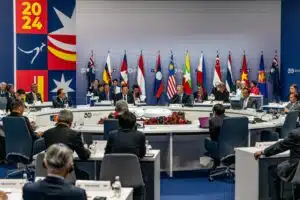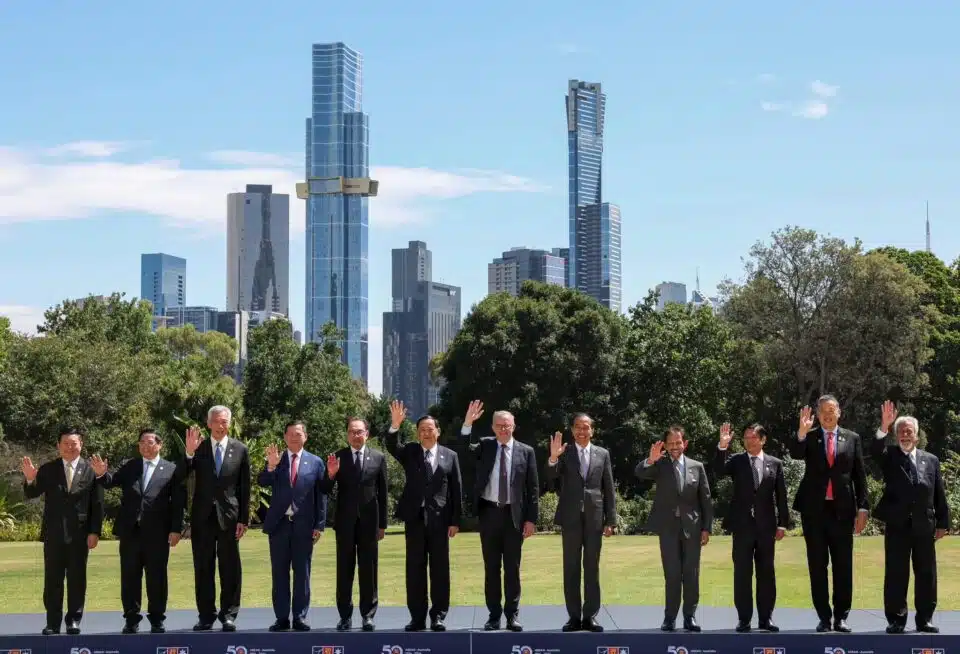MELBOURNE, March 6 — The 2024 Asean-Australia Special Summit concluded today with a series of outcomes especially in key focus areas such as business, emerging leaders, climate and clean energy, as well as maritime cooperation.
The three-day summit, which started on March 4 at the Melbourne Convention and Exhibition Centre, was attended by all the Asean members except for Myanmar due to the ongoing conflict in the country. Timor-Leste attended the gathering as an observer.
In 2022, Asean agreed in principle to admit Timor-Leste as its 11th member and adopted a roadmap for Timor-Leste’s full membership.
The special summit offers an opportunity for Asean leaders and Australia to commemorate the substantial achievements of Asean-Australia dialogue relations over the past five decades and to chart the course for even deeper relations in the next 50 years.
In his closing remarks, Laos Prime Minister cum the summit co-chair Sonexay Siphandone said this year marks 57 years of Asean’s establishment and commemorates the 50th anniversary of Asean-Australia Dialogue Relations.
“These numbers affirm that Australia is Asean’s oldest and closest friend; it is a long-standing and most important dialogue partner, engaging with Asean throughout its evolution.
“Over the years, Asean-Australia cooperation has consistently grown and broadened, covering a wide range of areas including political, security, economic, and social-cultural cooperation, and this partnership culminated in the elevation of our dialogue relations into a Comprehensive Strategic Partnership in 2021,” he said.
Co-chairman and Australian Prime Minister Anthony Albanese said Australia’s commitment to being an exemplary partner to the countries of Southeast Asia.
“We will continue to be constructive and to engage with respect, honesty and trust, and, importantly, to listen.
“Asean and Australia’s economies are deeply intertwined. We want to play a bigger role in Southeast Asia’s pursuit of economic opportunity, development, and growth,” he said in a statement.

Melbourne Declaration affirms Asean-Australia partnership
At the end of the special summit, Asean, Australia and Timor-Leste leaders reaffirmed their commitment to securing peace, stability, prosperity, and a sustainable future for the region.
Themed “A Partnership for the Future”, they committed to working together to address shared challenges while embracing opportunities which will benefit all who live in the region.
Australia and Asean leaders adopted the Asean-Australia Joint Leaders’ Vision Statement and the Melbourne Declaration, which set out the next 50 years of both parties’ enduring partnership to promote an open, inclusive, and transparent region with Asean at the centre.
Albanese announced a series of initiatives, including establishing an Asean-Australia Centre in Canberra; the offering of over 75 new Aus4Asean scholarships, some of which will be co-funded by Australian universities, and 55 fellowships for emerging leaders from the region to have an Australian education.
Others include an Energy Cooperation Package under the Aus4Asean Futures Initiative to enhance Asean-led regional energy policy and planning, including implementation of the Asean Strategy for Carbon Neutrality, as well as providing English language training for Timor-Leste to support its path to full Asean membership.
He reiterated Australia’s commitment to deepening two-way trade and investment with Asean to drive growth, which creates jobs and realises economic benefits for all people in the region.
The Albanese government also announced initiatives to implement key recommendations from Invested: Southeast Asia Economic Strategy to 2040, launched last year.
These include establishing an AU$2 billion (RM6.17 billion) Southeast Asia Investment Financing Facility to catalyse Australian investment in the region in key sectors like infrastructure and clean energy transition, as well as extending the Australia’s Partnerships for Infrastructure initiative which supports efforts to improve regional infrastructure development and attracting more diverse, quality infrastructure finance.
He also announced an appointment of 10 Business Champions to facilitate greater commercial links between Australia and Asean economies, ensuring the government and the private sector work in tandem to boost two-way trade and investment.
Another initiative is establishing regional “Landing Pads” in Jakarta and Ho Chi Minh City to bolster Australian technology exports and support the region’s digital transformation.
Albanese also announced improving visa access for Southeast Asia, with the extension of the Business Visitor Visa from three to five years, and the introduction of the Frequent Traveller stream, providing 10-year visas for eligible Asean member states.
He announced the first business mission under the Australia-Southeast Asia Business Exchange to Singapore and Malaysia in April, focusing on green energy transition and the location of regional hubs for Investment Deal Teams in Singapore, Jakarta, and Ho Chi Minh City.
The Australian government also focuses on initiatives to support the clean energy transition and practical maritime cooperation, including implementing the next phase of the Mekong-Australia Partnership to deepen Australia’s engagement in the Mekong subregion to address shared challenges, including water security, climate change and transnational crime.
“An allocation of AU$64 million (RM197.5 million) to enhance Australia’s Southeast Asia Maritime Partnerships will expand Australia’s maritime cooperation with regional partners and contribute to the security and prosperity of the region, consistent with the priorities of Southeast Asian countries,” said Albanese.
He also announced a provision of A$10 million (RM30.87 million) specific Climate and Clean Energy Window as part of the Southeast Asia Government-to-Government Partnerships Fund announced in 2023 to facilitate knowledge sharing and capacity building in addressing climate change.
— Bernama





